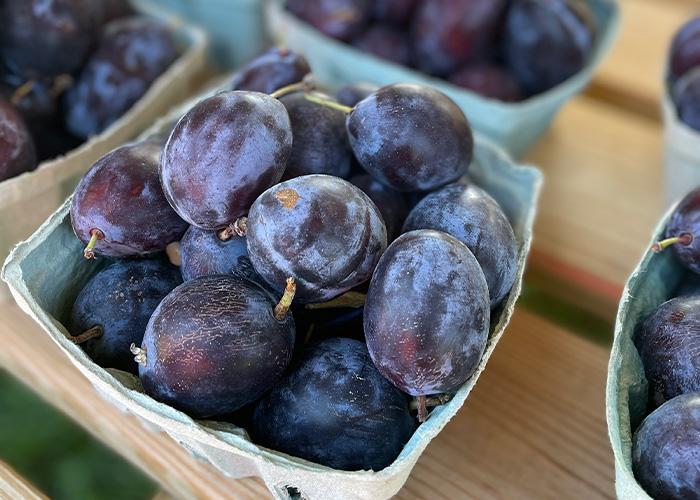-and-
With a modern, high density growing style, the Rosarios are planting new varieties with thinner trunks that can be grown closer together, producing more fruit.
Source: farmers.gov
By Lynnette Wright, FSA, New York
Sep 20, 2024
This Friday meet beginning farmer Iris Rosario, a first-generation Mexican American farming with her parents, Pablo and Bea, at Rosario Farm Inc., in Albion, New York. Iris’ parents are originally from Mexico and had been farmworkers across the southern United States. When they moved to New York, Pablo started working on an apple orchard and knew the orchard is where he was meant to be, working his way up the ladder from a picker to a manager of 38 employees. The Rosarios were able to purchase a farm of their own in 2016, an 80-acre apple orchard south of Lake Ontario.


Since purchasing the property, the Rosarios have been working to improve the orchard and replacing older trees with newer varieties. Now, with a modern, high density growing style, the Rosarios are planting new varieties with thinner trunks that can be grown closer together, producing more fruit. They’ve also grafted some of the older trees to grow new branches of more desirable varieties. Additionally, Iris and her family rent another orchard where they grow more apples and other fruits, including peaches, plums, pears, cherries, nectarines, and blueberries.
Adding Protection and Extending the Season
To protect their bottom line, they have federal crop insurance administered by USDA’s Risk Management Agency for their apples and peaches. Since the rest of their fruits are not eligible for crop insurance in their region of New York, they worked with their local USDA Farm Service Agency (FSA) office to enroll in the Noninsured Crop Disaster Assistance Program, which provides financial assistance to producers of non-insurable crops when low yields, loss of inventory, or prevented planting occur due to natural disasters.

-and-
“All the ladies working in the FSA office will help me understand the programs and paperwork,” Iris said. “I see them not only as people who help the farm and myself, I see them as friends.”
The Rosarios recently bought 10-acres of land neighboring their original orchard to serve as a nursery for apple tree saplings, and grow vegetables and herbs like sweet corn, tomatoes, zucchini, and cilantro. Earlier this year, they received funding to install a high tunnel system on the property through the Environmental Quality Incentives Program from USDA’s Natural Resources Conservation Service. High tunnels protect plants from severe weather and allow farmers to extend their growing seasons. Bea is especially looking forward to growing more vegetables in the high tunnel in the future.

“Growing up, life was very different than it is today. It was very hard financially speaking,” Iris said. “I would see my parents come home from work exhausted and they would have to sacrifice so much for us. To see these two people who came from a completely different country, speaking a whole other language, and not knowing that this dream would become a reality. It’s such a beautiful thing to see them now as successful people who are self-employed. They still work very hard, but it’s worth it because it’s theirs.”
Staying Motivated
At 19 years old, Iris oversees their blueberry production, including picking and sales. It’s a job she’s held for the last three years. “Picking blueberries is so tedious, you pick and pick, and it feels like you can never get ahead of them,” Iris said. She starts early in the morning but can’t pick all day because the heat makes the fruit warm and soft. “I have to sometimes sacrifice activities so I can go to sleep earlier and get up when it’s cool enough for the fruit to be picked.”

Iris is a highly motivated and responsible teenager. In addition to being part owner of the farm, she recently graduated from Genessee Community College with an associate’s degree in general studies. While in college, she was inducted into the National Society of Leadership and Success and is now pursuing an industrial electrical trade certificate. Iris also takes any opportunity to advance her farm management skills, attending seminars whenever she can.
“It’s a bit nerve-wracking attending things like that,” she said. “I know there’s not going to be another person that looks like me, a woman, and a Mexican American. Even though I have success of my own, I won’t be viewed the same as someone else. But I love to know that I can change that perspective, as long as I continue to push myself and put myself in uncomfortable situations, it’s going to be worth it in the long run.”
Iris is proud of what her family has achieved so far and knows what she wants in her future, “I was born in this life to be a boss woman!”

More Information
Visit local farms, ranches, forests, and resource areas through our Fridays on the Farm stories. Meet farmers, producers, and landowners who are working to improve their operations with USDA programs.
New to farming or want to learn how to start a farm? USDA offers dedicated help to beginning farmers and ranchers.
USDA offers a variety of risk management, disaster assistance, loan, and conservation programs to help producers weather ups and downs in the market and recover from natural disasters as well as invest in improvements to their operations. Learn about additional programs.
For more information about USDA programs and services, contact your local USDA service center.





